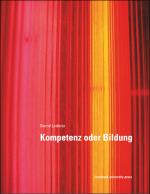Kompetenz oder Bildung
Author(s)
Lederer, Bernd
Collection
AG UniversitätsverlageLanguage
GermanAbstract
Education is a meaningful term. Investments in education are an indispensable prerequisite for individual and social well-being. But what exactly does education or being-educated mean? What kind of human qualities and knowledge are referred to with the term “well- or higher-educated” in its german equivalent “Bildung”? But is “Bildung” really the equivalent of “higher-education” or is the term “Bildung” more or less lost in translation? In this regard, this book provides a lot of relevant definitions and characterizations of “Bildung”, it illuminates historical backgrounds and offers a large number of conceptual clarifications and delimitations. In this regard it is specifically the term “competence” resp. “skills” that has to be explicitly distinguished from “education” resp. “Bildung”. The basic thesis of this book is, that whenever politics, business and science are calling for “higher-education” today, they don’t really desire the emancipated, mature human being, but mostly just competence and skills. Instead of self-reflection and self-awareness, self-development and self-determination, all of which are elementary target dimensions of “Bildung”, it is above all the goal of a self-organized ability to act, the main concern of “competence”, in order to be able to survive on the flexible, competitive labor markets of the "knowledge society". Accordingly, this book also sees itself as a plea for a critical return and re-examination of a comprehensive, "trans-instrumental" and precisely non-economically functional understanding of education. - Bildung ist ein allgegenwärtiger Begriff. Investitionen in Bildung gelten als unverzichtbare Voraussetzung für individuelles wie gesellschaftliches Wohlergehen. Doch was bedeutet Bildung bzw. Gebildet-Sein eigentlich genau? Welche menschlichen Qualitäten, welche Eigenschaften und Kenntnisse werden mit dem Begriff Bildung bezeichnet oder sollten vielmehr damit bezeichnet werden? Dieses Buch stellt diesbezüglich eine Fundgrube einschlägiger Definitionen und Charakterisierungen dar, es beleuchtet eine Fülle geschichtlicher Hintergründe und liefert eine Vielzahl begrifflicher Klärungen und Abgrenzungen. So wird etwa der Frage nachgegangen, in welchem Verhältnis Wissen und Lernen zu Bildung stehen. Es ist jedoch speziell der ebenfalls dauerpräsente Kompetenzbegriff, der hier nicht nur ausdrücklich von Bildung unterschieden wird, sondern dem ein humanistisches und emanzipatorisches Bildungsverständnis geradezu entgegengehalten werden soll. Wenn heute nämlich in Politik, Wirtschaft und auch Wissenschaft von Bildung die Rede ist, so die grundlegende These, ist meistens doch nur Kompetenz gemeint. Anstelle von selbstzweckhafter Selbstreflexion und Selbsterkenntnis, Selbstentfaltung und Selbstbestimmung, allesamt elementare Zieldimensionen von Bildung, geht es heute in erster Linie doch eher um selbstorganisierte Handlungsfähigkeit, dem Hauptanliegen von Kompetenz, um auf den flexiblen, wettbewerbsintensiven Arbeitsmärkten der „Wissensgesellschaft“ bestehen zu können. Entsprechend versteht sich dieses Buch auch als Plädoyer für eine kritische Rück- und Neubesinnung auf ein umfassendes, „transinstrumentelles“ und eben nicht ökonomisch-zweckfunktional enggeführtes Verständnis von Bildung.
Keywords
Educational Sciences; Learning Theory; Bildungswissenschaft; BildungstheoriePublisher
innsbruck university pressPublisher website
https://www.uibk.ac.at/iupPublication date and place
Innsbruck, 2014Series
Thesis series,Classification
Education


 Download
Download Web Shop
Web Shop